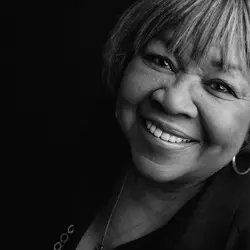 Mavis Staples
Mavis StaplesOnce the baby of The Staple Singers, and now a matriarch of the gospel/blues and civil rights iconic group, Mavis Staples’ most recent offering is Don’t Lose This, a record of music by her late father Roebuck ‘Pops’ Staples, that she’s developed with Wilco’s Jeff Tweedy.
“When Tweedy and I first got together people would say, ‘You two are an odd couple,’ but you don’t know, music is music,” Staples says of her working relationship with the alt-country musician. “And the way he started working on the record, it was just like we’d been working together for years.”
“I really wish that Tweedy could have met Pops."
Tweedy has worked with Staples at least twice before on albums - You Are Not Alone (2010) and One True Vine (2013), but with Don’t Lose This there was a new relationship. “Pops asked me when he made the record, he said, ‘Don’t lose this’… I felt like he told me that because he wanted it to be heard, and this is me fulfilling my father’s last request, but I knew that it needed tweaking, and the first person who came to mind was Jeff Tweedy. So where Pops’ playing some songs Tweedy’s just playing some bass, he just filled it in a bit, and no one would know, it’s so beautiful, it’s so smooth, I said, ‘Wow. I’m so happy.’ I went over to the Wilco loft to hear it when they first finished, and I tell you, I just rejoiced; it felt like Papa was in the room, and then I just flooded with tears, it sounded so good.”
Does she ever wonder what the two musicians would have thought of each other if they had actually been playing together in the same room? “I really wish that Tweedy could have met [Pops]; he would have been tickled pink with Jeff Tweedy... But I told Tweedy, ‘It’s okay, Paps knows what we’re doing, he knows about this record, he knows you helped.’”
“I’m not too anxious to go to the movies to see Selma."
Don't miss a beat with our FREE daily newsletter
Beyond Mavis’ own projects, The Staples’ legacy continues. The group were important sounds of the civil rights movement of the 1960s, and as such, their work appears in new histories of the time like Ava DuVernay’s new film Selma. “I’m not too anxious to go to the movies to see [Selma] because I feel like I’ve already seen it, you know. I understand they’re playing our music in the movie, they’re playing Why Am I Treated So Bad, which was Dr King’s favourite song,” Staples says.
“I probably will go and see it but I’d kind of hate to go through that again because I was there, you know. But it’s good for the young people, our young black kids, because they don’t teach black history in schools. So it’s good for them to know where we come from, to know what we went through, because these generations, these last three generations, they don’t know, so that’s where I see it as a good thing, for the young black kids, and the white kids too, to know about it.”















